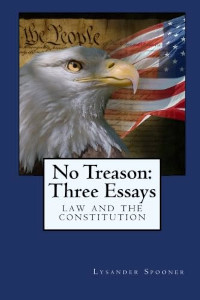No Treason is a series of three numbered essays written and published by Lysander Spooner between 1867 and 1870. No Treason: No. 1 (1867) deals with the implications of government by consent. No Treason: No. II: The Constitution (1867) examines the preamble of the United States Constitution and the definition of "treason" given in Article III. The better known No Treason: No. VI: The Constitution of No Authority was published in 1870, noting it was "in advance of" the third through fifth issues (which ended up not being published afterwards). No. VI argues that the Constitution cannot have authority or impose obligations on people currently living in the United States and discusses arguments about voting or the payment of taxes, denying those acts imply voluntary consent.
Review of The Lysander Spooner Reader (1992), which includes No Treason, from LaissezFaireBooks.com, by Tom G. Palmer, August 1992:
If you want to shake up a friend—or even yourself—I know just the person to do it. If Lysander Spooner cannot inspire a reexamination of everything you learned in high school, then nobody can.
It has been nearly twenty years since I read Spooner in high school, and my life has not been the same since. After wrestling with Spooner's tightly reasoned arguments against the state in No Treason: The Constitution of No Authority you'll never look at the government the same way again. I guarantee it. (It's also guaranteed to get you in trouble with your high school principal, as it did me.)
A Fascinating Figure
Lawyer, abolitionist, radical, friend of liberty: that was Lysander Spooner, one of the most fascinating figures to emerge from American history. A ferocious opponent of slavery, he supported the right of secession. An ardent enemy of statist legislation, he was a brilliant jurist who put his faith in the law. An eloquent foe of prohibition of alcohol or drugs, he offered a moral defense of liberty.
Spooner inspired both John Brown's anti-slavery raid on Harper's Ferry and the "Spooner Acts" passed by the U.S. Congress to put his private post office out of business and cement the state's postal monopoly. But try to find his name in a high school or college history textbook. Uh-uh—too radical.
Until now, Spooner was accessible only through a few obscure sources, including the extremely expensive six volume facsimile edition of his Collected Works. Fortunately, that has now changed. The independent scholar George H. Smith has pulled the very best of Spooner into a readable anthology of unabridged essays, including the wonderful "Vices Are Not Crimes: A Vindication of Moral Liberty," a real gem that did not appear in the Collected Works. (This essay is one of the most eloquent defenses of freedom of choice I have ever read, offering a smashing refutation of every argument for prohibition of alcohol, drugs, smoking, or other non-coercive "vices.") This edition is newly typeset and attractively printed.
No Treason
In addition to "Vices Are Not Crimes," Smith has included Spooner's short essay on "Natural Law" (still, to my mind, one of the very best things written on the subject, in which he clearly distinguishes between moral duties and legal—or enforceable—duties), the essay "Trial by Jury," which argues cogently for the right of "jury nullification" of unjust statutes, the "Letter to Thomas Bayard: Challenging the Opinion that is at least Possible to be a Legislator ... and yet be an Honest Man," and his breathtakingly radical No Treason, undoubtedly the most subversive work ever written. Any one of these essays would justify the price of the book.
Spooner was a master of one of the great forms of political discourse: the pamphlet. This form of communication—encompassing all of the elements of classical rhetoric in a relatively short space—was immensely important to the growth of classical liberal and libertarian thought. Think of Tom Paine, Frederic Bastiat, Richard Cobden, Lysander Spooner, Rose Wilder Lane, Ayn Rand. Many are acquainted with Lane or Rand, Cobden or Bastiat, but far too few know Spooner, certainly the most colorful and interesting of the group.
One nice thing about Spooner's style is that he doesn't make you wade through a gigantic treatise; each essay is concise, short, and to the point. This is a perfect companion for a trip to the beach, but don't put it by the bedstand, because I promise you that it won't put you to sleep. It's hard to describe what it's like to read Lysander Spooner. Think of F.A. Hayek on speed. Or Ayn Rand with a law degree. Or ... well, there's really no comparison. Spooner is in a class of his own.
Recharge Your Batteries
The Lysander Spooner Reader includes a quite useful introduction by Smith, in many ways a contemporary equivalent of Spooner himself, and the eulogy for Spooner by the American individualist anarchist publisher Benjamin Tucker, "Our Nestor Taken From Us." Both are worth reading for their insights into a giant of American pro-freedom political thought.
I have a bit of advice: Don't buy The Lysander Spooner Reader just to inform yourself about an important strand of American political thought (although it will do that). Buy it to recharge your batteries, to rediscover why you love freedom, or to introduce yourself to the most tightly reasoned logical defense of liberty. I recommend this book most highly.
If you would like to acquire an edition of this work, and thus help our work here at Freedom Circle, please click on the product image below:

